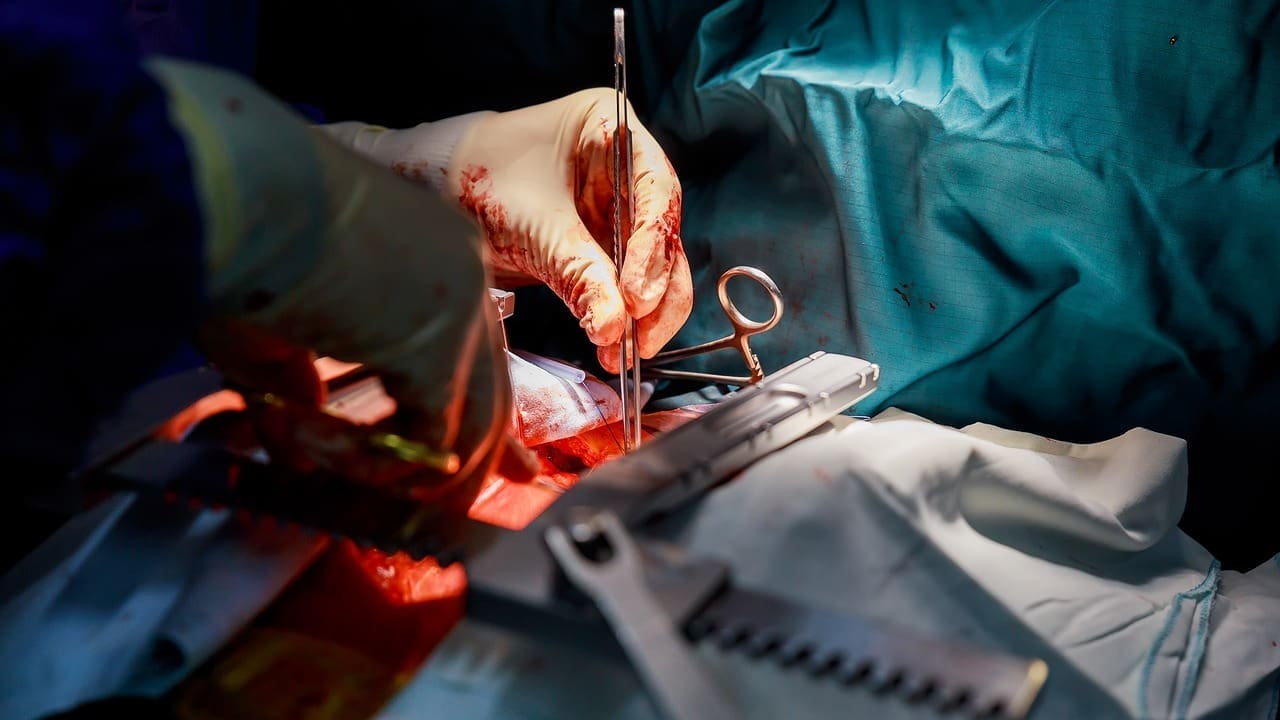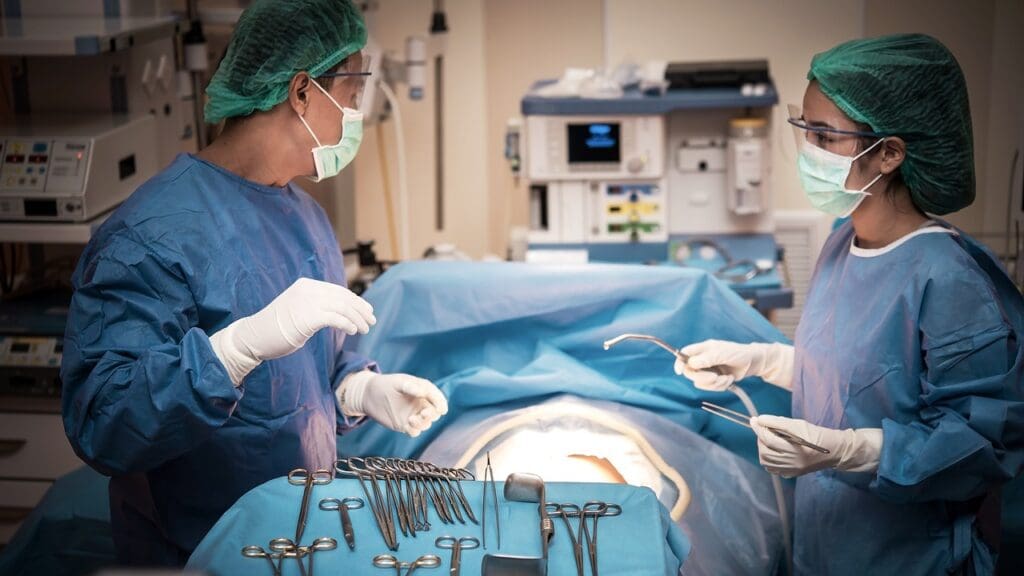
Thinking about surgery for a herniated disc means knowing the risks. At Liv Hospital, we stress the need to understand possible outcomes before surgery. Surgery can help, but it comes with its own set of risks.
We’ll look at the complications that can happen with herniated disc surgery. We want to give you all the facts. This way, you can make a smart choice about your treatment.
Key Takeaways
- Knowing the risks and complications of herniated disc surgery is key.
- Nerve injury, infection, and dural tears are some possible issues.
- Liv Hospital puts patient safety and informed choices first.
- Surgery can be a good option, but it’s important to know the risks.
- Being well-informed helps patients make confident decisions about their care.
Herniated Discs: When Surgery Becomes Necessary

Deciding to have surgery for a herniated disc depends on several factors. Many herniated or bulging discs can be treated without surgery. But, some cases may need surgery.
What Is a Herniated Disc?
A herniated disc happens when the soft center of the disc leaks out. This is due to a tear in the outer disc. It can cause pain, discomfort, and nerve problems if it presses on nerves.
Conservative Management vs. Surgical Intervention
Most people with herniated discs start with non-surgical treatments. This includes physical therapy, pain meds, and changes in lifestyle. But, if these don’t help, or if symptoms are severe, surgery might be needed.
Key indicators for surgical intervention include:
- Severe pain that doesn’t get better with non-surgical treatments
- Progressive neurological deficits
- Significant nerve compression
Neurological Deficits Requiring Immediate Attention
Certain neurological problems need quick medical help. These include sudden weakness, numbness, or tingling in the legs. This could mean nerve compression.
Cauda Equina Syndrome: A Surgical Emergency
Cauda equina syndrome is a serious issue. It happens when nerves in the lower spine get compressed. This leads to severe neurological symptoms. It’s a surgical emergency, and quick action is needed to avoid lasting damage.
Understanding when surgery is needed for herniated discs is key for making the right treatment choices. Recognizing the signs and symptoms that mean surgery is necessary helps patients and doctors decide the best treatment plan.
Common Surgical Options for Herniated Discs

When other treatments don’t work, surgery can help with herniated discs. The right surgery depends on how bad the herniation is, the patient’s health, and the surgeon’s skills. We’ll look at the main surgeries for herniated discs, their benefits, and risks.
Open Discectomy
Open discectomy is a traditional surgery. The surgeon makes a big cut to get to the herniated disc. This method removes the damaged part of the disc that’s hurting the nerves. It’s a tried and true method with many successful cases. But, it has a bigger cut and more tissue damage than newer methods.
Microdiscectomy
Microdiscectomy is a smaller version of open discectomy. It uses a microscope and small cuts to take out the herniated disc. This way, less tissue is damaged and recovery is faster. It works well for lower back disc problems.
Endoscopic Techniques
Endoscopic discectomy uses a small camera to see the disc and nerves. It’s very minimally invasive and can be done with just local anesthesia. It helps in quick recovery and less scarring. The damaged disc part is removed through a small tube.
Minimally Invasive Approaches
Minimally invasive surgeries for herniated discs aim to cause less damage and help you heal faster. They use smaller cuts and special tools. They lead to less pain after surgery and shorter hospital stays. The choice between these and traditional surgeries depends on the case and patient needs.
In summary, there are many surgical options for herniated discs, each with its own benefits and considerations. Knowing these options is key to making the right choice for your surgery.
Herniated Disc Operation Risks: An Overview
Herniated disc surgery is usually safe, but there are risks and complications. Knowing these risks helps patients make better treatment choices.
General Complication Rates
Complication rates for herniated disc surgery are low. They vary based on the procedure and patient factors. Studies show complications range from 1% to 10%. Most are minor and short-lived.
Risk Factors That Increase Complication Likelihood
Some factors raise the risk of complications during or after surgery. These include older age, obesity, diabetes, and pre-existing conditions. Knowing these risk factors before surgery is key to reducing complications.
Pre-Surgical Considerations
Before surgery, patients should talk about their risks with their surgeon. They should review their medical history and understand their procedure’s risks. Following pre-surgical instructions carefully helps avoid complications.
Understanding and managing the risks of herniated disc surgery leads to better outcomes. This ensures the best results from treatment.
Complication #1: Nerve Injury and Damage
Herniated disc surgery is usually safe but can cause nerve injury. This is a serious issue to think about. Nerve injury can happen for many reasons, like direct damage, compression, or lack of blood flow during surgery.
How Nerve Damage Occurs During Surgery
Nerve damage can happen in a few ways during herniated disc surgery. It can be caused by surgical tools, too much pulling or stretching, or not enough blood to the nerves. Knowing these risks helps both doctors and patients make better choices.
Symptoms of Nerve Injury
The signs of nerve injury can be different for everyone. They can range from a little numbness or tingling to a lot of weakness or paralysis. People might feel pain, changes in feeling, or problems with moving, depending on the nerves affected.
Long-term Implications
Nerve injury can have lasting effects. It might lead to ongoing pain, lasting nerve problems, or a lower quality of life. How bad these effects are depends on the injury’s severity and how well it’s treated.
Treatment Options for Nerve Damage
There are ways to treat nerve damage from herniated disc surgery. Doctors might start with medicines and physical therapy. In some cases, more surgery is needed to fix the nerve. Catching the problem early and acting fast is key to getting better.
| Treatment Approach | Description | Potential Outcomes |
|---|---|---|
| Conservative Management | Medications, physical therapy | Symptom improvement, functional recovery |
| Surgical Intervention | Revision surgery to repair nerve damage | Nerve function restoration, pain relief |
Complication #2: Infection and Bleeding Issues
It’s important to know about the risks of herniated disc surgery. This includes infections and bleeding problems. These issues are rare but knowing about them can help improve patient care.
Surgical Site Infections: Incidence and Management
Surgical site infections (SSIs) can happen after herniated disc surgery. Incidence rates vary, but they are rare. If an infection occurs, treatment usually includes antibiotics. Sometimes, more surgery is needed.
Bleeding Complications
Bleeding during or after surgery is another risk. Excessive bleeding can cause serious problems. This might include needing blood transfusions or more surgery.
Prevention Strategies
To prevent infections and bleeding, several steps are taken. This includes proper wound care and watching for signs of problems.
Warning Signs to Watch For
Patients should look out for signs of infection and bleeding. These include increased pain, fever, or swelling. It’s important to tell healthcare providers right away if these symptoms appear.
Complication #3: Dural Tears and Cerebrospinal Fluid Leaks
Dural tears and cerebrospinal fluid leaks are serious issues that can happen during or after herniated disc surgery. These problems occur when the dura mater, the protective layer around the spinal cord, tears. This allows cerebrospinal fluid to leak out.
Understanding Dural Tears
Dural tears happen in about 1-6% of herniated disc surgeries. The exact rate can change based on the surgery method and how complex the case is.
Symptoms and Diagnosis
Symptoms of dural tears and cerebrospinal fluid leaks include headaches, nausea, and vomiting. These symptoms often happen because of changes in pressure inside the skull. Doctors usually diagnose this through a physical check-up and imaging like MRI.
Treatment Approaches
Treatment might start with rest and drinking lots of water. In some cases, surgery is needed to fix the dural tear.
Long-term Outcomes
Most people get better from dural tears and cerebrospinal fluid leaks. But, some might keep feeling symptoms. It’s important to know about these risks and how to manage them to make informed choices.
| Complication | Incidence | Typical Management |
|---|---|---|
| Dural Tears | 1-6% | Conservative or Surgical |
| Cerebrospinal Fluid Leaks | Varies with dural tear incidence | Bed rest, hydration, or surgical repair |
Complication #4: Re-herniation and Revision Surgery
Re-herniation after herniated disc surgery is a worry. It might mean you need more surgery and could slow down your healing. Re-herniation happens when the disc bulges again, needing more surgery.
Re-herniation Rates
About 10 to 15 percent of people experience re-herniation within six weeks after surgery. This can be upsetting and might mean more treatment is needed.
Risk Factors for Recurrence
Several things can make re-herniation more likely. These include your health, the surgery method, and how well you recover. Knowing these can help manage your expectations and lower the chance of it happening again.
What to Expect from Revision Surgery
Revision surgery for re-herniation is usually more complicated than the first surgery. We’ll talk about what to expect during and after this surgery. This includes possible outcomes and how long it might take to recover.
Strategies to Minimize Re-herniation Risk
To lower the risk of re-herniation, follow your doctor’s post-op instructions carefully. Stay healthy and go to all your follow-up appointments. These steps can help avoid needing more surgery.
By knowing the risks of re-herniation and taking action, you can make better choices about your care. This can help improve your recovery.
Complications #5-7: Post-Operative and Long-Term Risks
Herniated disc surgery is usually effective but comes with risks. It’s important to know these risks to make good choices and set realistic expectations.
Complication #5: Deep Vein Thrombosis
Deep vein thrombosis (DVT) is a serious issue after herniated disc surgery. It’s when a blood clot forms in the deep veins, usually in the legs. Preventive steps include moving early, wearing compression stockings, and taking anticoagulant meds. It’s key to spot DVT symptoms like leg pain or swelling to get treatment quickly.
Complication #6: Persistent Numbness and Nerve Scarring
Some people might feel numbness or nerve scarring after surgery. This could be from nerve damage during the surgery or the body’s reaction to it. Dealing with these symptoms often means physical therapy, pain meds, and sometimes more surgery.
Complication #7: Degenerative Disc Disease at Operated Segments
Surgery can sometimes make degenerative changes worse at the operated area or nearby. This is called degenerative disc disease. It might need more surgery. It’s vital to keep an eye on these changes with regular check-ups and the right treatments.
Managing Long-term Complications
Handling long-term issues needs a team effort. This includes changing your lifestyle, physical therapy, and sometimes more surgery. Teaching patients and regular check-ups are key to managing these problems. Knowing the risks and working with doctors can help avoid these issues and get the best results.
Conclusion: Making an Informed Decision About Herniated Disc Surgery
Thinking about surgery for a herniated lumbar disc? It’s important to know the possible risks and complications. We’ve looked at issues like nerve injury and re-herniation. This helps patients understand their options better and choose what’s best for them.
Many wonder, “Should I have surgery for a herniated disc?” It really depends on how bad the symptoms are and if other treatments work. We’ve shared key complications to help patients make informed choices.
Deciding on herniated disc surgery needs a full understanding of risks and benefits. By considering these, patients can pick the right treatment for their situation.
Does a herniated disc always require surgery?
No, not all herniated discs need surgery. Many cases can be treated with physical therapy, pain management, and lifestyle changes.
What are the risks associated with herniated disc surgery?
Surgery risks include nerve injury, infection, and bleeding. Other risks are dural tears, cerebrospinal fluid leaks, and re-herniation. Also, there’s a chance of deep vein thrombosis, persistent numbness, nerve scarring, and degenerative disc disease at the operated segment.
How common are complications from herniated disc surgery?
Complications are rare but can happen. Nerve injury, infection, and re-herniation are common in some patients. This depends on several risk factors.
What is the difference between open discectomy and microdiscectomy?
Open discectomy uses a bigger incision. Microdiscectomy, on the other hand, uses a smaller incision and a microscope. This method aims to cause less damage and speed up recovery.
Can nerve damage from herniated disc surgery be treated?
Yes, nerve damage can be treated. Options include physical therapy, pain management, and sometimes more surgery to fix the nerve.
How can I minimize the risk of re-herniation after surgery?
To lower re-herniation risk, stay healthy, exercise regularly, and maintain good posture. Avoid heavy lifting and bending.
What are the symptoms of a dural tear or cerebrospinal fluid leak?
Symptoms include headache, nausea, vomiting, and clear fluid leakage from the surgical site. Seek immediate medical help if you notice these signs.
Is degenerative disc disease a guaranteed outcome after herniated disc surgery?
No, degenerative disc disease is not a sure outcome. Proper care and follow-up can help manage it.
Can I undergo surgery for a herniated disc if I have other health conditions?
Surgery decisions depend on many factors. These include the severity of your herniated disc, your overall health, and other medical conditions. Your healthcare provider will assess your situation and guide you.
How long does it take to recover from herniated disc surgery?
Recovery time varies. It depends on the surgery type, individual factors, and health. Generally, people can return to normal activities in weeks to months after surgery.
References
- Christopher P. Silveri, MD: https://www.christophersilverimd.com/possible-complications-of-spinal-surgery-christopher-p-silveri-md.html
- National Center for Biotechnology Information (NCBI) / PMC: https://pmc.ncbi.nlm.nih.gov/articles/PMC9547702
- NHS (UK): https://www.nhs.uk/tests-and-treatments/lumbar-decompression-surgery/risks
- Florida Surgery Consultants: https://floridasurgeryconsultants.com/discectomy-surgery-complications



































